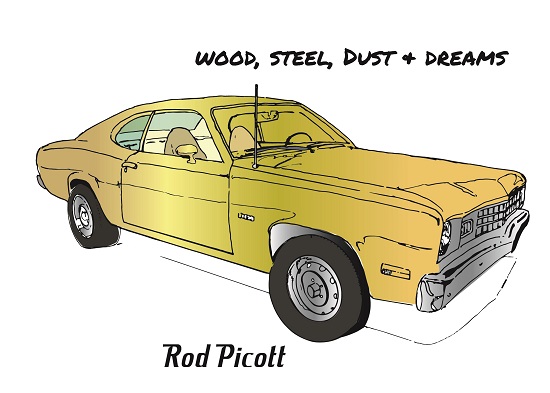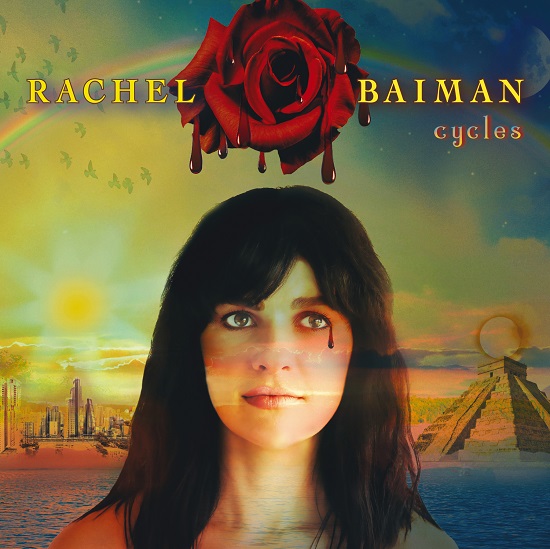
It’s difficult to review a Rod Picott album without mentioning Raymond Carver. There we go, that’s out of the way now, we don’t have to go back to that, valid as it is. “Wood, Steel, Dust + Dreams” is in the category of ‘Great idea; will it actually work?’ (spoiler alert – it will). The great idea was to take the twenty-five songs that Rod had co-written with childhood buddy and long-time collaborator Slaid Cleaves and rework them as a record of their collaboration. And there’s another interesting idea; the two-disc collection will only be available on CD. No, downloads, no streaming; you buy the album directly from Rod and no-one else takes a slice of it. Or, even better, you could go out and catch him on his UK tour (details below) and put some money in his hand personally in exchange for two CDs. It’s a nice way to get your music fix.
The title of the album sums things up neatly (although ‘rust’ could have featured as well). This album is packed with American blue-collar songs; we’re not taking Manhattan or Berlin, we’re dealing with people doing back-breaking manual labour in the rust belt and busting out at the weekend, drinking, racing cars or gambling and you can feel the authenticity running through every song. Running to twenty-five songs over two CDs, it’s a lot of songs. As our Northern reporter, Steve Jenner, used to say about “Sandinista”, you need a packed lunch for that one. There’s no filler; they’re all great songs and the list of musicians on the album is very impressive – Will Kimbrough, Matt Mauch, Lex Price and Neilson Hubbard are all on board, with Hubbard producing and there’s even a guest harmony from Slaid Cleaves. The production is very light touch, creating ambient soundscapes that pull the attention to the songs and Rod’s ‘groaning wound of a voice’ (his own words) and the raw power of the songs.
It’s subjective and a bit tricky to pick out favourites, but here are a few of my personal highlights. “Rust Belt Fields” tells the story the America sold when corporations discovered cheaper labour in Mexico and China and the impact it had on the workers and towns left marooned as the jobs evaporated; it’s despair and the knowledge that there’s no recognition for hard work. Two songs sitting side by side on CD Two are perfect demonstrations of the power and subtlety of the songwriting; “Drunken Barber’s Hand” is a menacing view of a malign force guiding the world, while “Primer Gray” is a perfect example of a song working on two levels. It’s a straightforward story about someone escaping from the grind by racing his car at the weekend. All the attention is paid to the engine and the body work and paint job is irrelevant because it doesn’t make the car faster. On another level, it’s about the music business (and humanity in general); all the glitz in the world can’t hide a hollow centre.
If you want a masterclass in songwriting and delivery, you don’t need to go any further than “Wood, Steel, Dust + Dreams”. Simple stories about real people delivered with the minimum of fuss and maximum of heart.
“Wood, Steel, Dust + Dreams” is out now on Welding Rod Records.

It’s all worthwhile when you hear an album as good as this. Rachel Baiman has created a collection of ten songs with a range of Americana musical stylings that is intensely personal while also referencing current social and political issues in the USA (although the album was recorded in Australia). The other thing you’ll notice about the songs is that whether personal or political, they mainly address issues that directly affect women (Rachel herself, her sister, her sister-in-law and her grandmother). They aren’t all happy stories, but that’s the whole point; the various cycles of life have good and bad phases. The mid-tempo title song, with its distinctive layered vocal is a tragic and yet uplifting story of two generations of women from the same extended family binding together in mutual support to deal with a still-birth and then a difficult birth; it’s deeply moving.
The two overtly political songs sit side by side on the album. “Rust Belt Fields” is Rachel’s take on a Rod Picott/Slaid Cleaves song; the song’s ten years old, but still sounds relevant. The minimalist one-bar percussion loop creates the relentless feel of the automobile production line, lost forever to more cost-effective (exploitative) overseas territories. The song is a fatalistic acceptance of the corrosion of the Steel Belt to the Rust Belt and the unmourned loss of the jobs this entailed: ‘No-one remembers your name just for working hard’. “Wyoming Wildflowers” is a Rachel Baiman/Olivia Hally song that uses the theme of diverse colours in nature to skewer white supremacist views. The lyrics are set against a gentle country-rock arrangement and the message is emphasized by the repetition of the final two lines.
There are ten superb examples of the songwriter’s art on “Cycles” including another that pressed all of my buttons, “No Good Time for Dying”, which deals with watching someone you love suffer the indignities of a protracted death; it’s not pretty, but it’s the end of the cycle that starts with the opening song. The album’s final song, “The Distance”, tackles the way we habitually deal with recurring life situations in the same way because it’s easier than thinking about another way.
The Rachel Baiman/Olivia Hally musical arrangements and production on “Cycles” are deceptively simple while featuring ambient instrumental sounds and layers of vocals that always allow the songs plenty of room to breathe. There are hints at times of the vocal stylings of Neil Young, Emmylou Harris, and even Rickie Lee Jones (on “No Good Time for Dying”) but the bottom line is very much Rachel Baiman, teasing out themes of family, work versus relationships, politics and even the “I Will Survive” sentiment of “Hope it Hurts”. This album is complex, sometimes painful and very rewarding.
“Cycles” is released in the UK on Signature Sounds Recordings (SIG-CD-2129 / SIG-LP-7038) on Friday June 11th. Here’s the video to “Joke’s On Me”:


